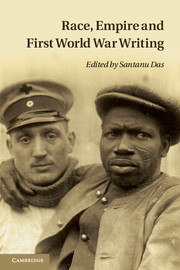Book contents
- Frontmatter
- Contents
- List of illustrations
- Acknowledgements
- Notes on contributors
- Introduction
- PART I VOICES AND EXPERIENCES
- PART II PERCEPTIONS AND PROXIMITIES
- PART III NATIONALISM, MEMORY AND LITERATURE
- 11 ‘He was black, he was a White man, and a dinkum Aussie’: race and empire in revisiting the Anzac legend
- 12 The quiet Western Front: the First World War and New Zealand memory
- 13 ‘Writing out of opinions’: Irish experience and the theatre of the First World War
- 14 ‘Heaven grant you strength to fight the battle for your race’: nationalism, Pan-Africanism and the First World War in Jamaican memory
- 15 Not only war: the First World War and African American literature
- Afterword Death and the afterlife: Britain's colonies and dominions
- Index
- References
13 - ‘Writing out of opinions’: Irish experience and the theatre of the First World War
Published online by Cambridge University Press: 05 February 2014
- Frontmatter
- Contents
- List of illustrations
- Acknowledgements
- Notes on contributors
- Introduction
- PART I VOICES AND EXPERIENCES
- PART II PERCEPTIONS AND PROXIMITIES
- PART III NATIONALISM, MEMORY AND LITERATURE
- 11 ‘He was black, he was a White man, and a dinkum Aussie’: race and empire in revisiting the Anzac legend
- 12 The quiet Western Front: the First World War and New Zealand memory
- 13 ‘Writing out of opinions’: Irish experience and the theatre of the First World War
- 14 ‘Heaven grant you strength to fight the battle for your race’: nationalism, Pan-Africanism and the First World War in Jamaican memory
- 15 Not only war: the First World War and African American literature
- Afterword Death and the afterlife: Britain's colonies and dominions
- Index
- References
Summary
One of the most celebrated Irish literary spats of the early twentieth century arose when, in 1928, the poet W. B. Yeats rejected Sean O'Casey's play The Silver Tassie for production in Dublin's Abbey Theatre, of which Yeats was a director. The play follows the journey of Harry Heegan from Ireland to serve on the Western Front and his return home crippled by war wounds. ‘You are not interested in the great war,’ Yeats told O'Casey, ‘you never stood on its battlefields or walked its hospitals, and so write out of your opinions’. Arguing, furthermore, that the inherent dramatic power of a work was the chief consideration, rather than any possible ‘message’, Yeats went on to declare that ‘among the things that dramatic action must burn up are the author's opinions; while he is writing he has no business to know anything that is not a portion of that action’. Beyond his assertion that O'Casey was apparently unequipped to write about the Great War, Yeats had a more general uneasiness with the topic of war as a suitable subject for literary works, as most famously demonstrated in his editorial approach to the 1936 Oxford Book of Modern Verse, in which he chose to omit work now regarded as quintessential Great War poetry (including, for example, poems by Wilfred Owen).
- Type
- Chapter
- Information
- Race, Empire and First World War Writing , pp. 249 - 264Publisher: Cambridge University PressPrint publication year: 2011



